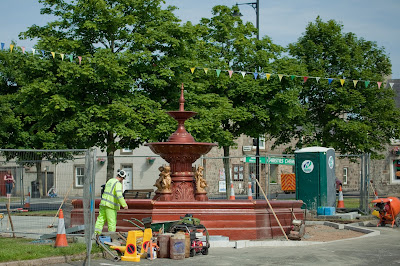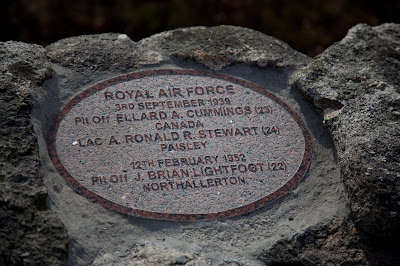Revising Aung San Suu Kyi – By Duncan Harley
I was over in Huntly earlier today and picked up a copy of
the Northern Scot. It’s a splendid paper and winner of more awards than I care
to remember.
Full of local news, it carries a good spread of feature articles.
Full of local news, it carries a good spread of feature articles.
In last week’s edition, which was the one I bought, there
are tales of fiddlers from Fochabers, firefighters from Buckie and, of course a
leader describing how Elgin High Street is about to take on the mantle of ‘Best
High Street in Britain’.
There is a new editor in post now and the broadsheet has shrunk to a tabloid. But, in the big scheme of things – and I am biased since a previous editor gave me my first start in print – the paper sure beats the hell out of most weekly rags.
There is a new editor in post now and the broadsheet has shrunk to a tabloid. But, in the big scheme of things – and I am biased since a previous editor gave me my first start in print – the paper sure beats the hell out of most weekly rags.
On page 34 there is a poignant piece by Jill Stewart – a local
historian – detailing the endgame of those folk from Moray unlucky enough to
have died as a result of enemy action during the first war. A lad from Findochty
– died of wounds in a French hospital. A Lossie man killed at Ypres. A
Lhanbryde Major killed in action near Cambrai. The words are
spread over two pages and there is no doubt more to come in next week’s
edition.
My next book has a few such tales of remembrance as does my
last book but I was somehow reminded of a tale from some far off Leopard Magazine.
It was about a lad from Fochabers. A bank clerk as I recall. He had enlisted to fight in the Boer War and it was the end
of him. The Northern Scot published the piece alongside a splendid image of Michael
Caine at Rourke’s Drift. I think I still have the cutting.
I re-published an amended version in Leopard Magazine titled
Major Wilson’s Last Stand. And it read as follows – apologies for the long read
…
“The North-east town of Fochabers is home to two memorial fountains.
Pride of place goes to the refurbished cast-iron fountain, complete with
acanthus leaves and cherubs, which dominates the town square and bears the
inscription: “Erected by the inhabitants of Fochabers in acknowledgement of
the liberality of the Sixth Duke of Richmond and Gordon in supplying water to
the Town - 1878.”
A more modest drinking fountain stands alongside the cricket field at the north end of the High Street, opposite the Fochabers & Bellie War Memorial. Made from red and grey polished granite, and also recently restored, it stands on a hexagonal base bearing the inscription: “Erected by the natives of Fochabers to commemorate the heroic stand made against the forces of the King of Matabeleland by Major Allan Wilson of this town who with a small band of comrades fell bravely fighting against overwhelming odds near the Shangani River in South Africa on the 4th of December 1893.”
A more modest drinking fountain stands alongside the cricket field at the north end of the High Street, opposite the Fochabers & Bellie War Memorial. Made from red and grey polished granite, and also recently restored, it stands on a hexagonal base bearing the inscription: “Erected by the natives of Fochabers to commemorate the heroic stand made against the forces of the King of Matabeleland by Major Allan Wilson of this town who with a small band of comrades fell bravely fighting against overwhelming odds near the Shangani River in South Africa on the 4th of December 1893.”
Modern-day Matabeleland is a region in Zimbabwe. In 1893, the
Anglo-Zulu Wars were in full swing. The First Matabele War had origins in
border disputes between King Cetshwayo and the Boers in the Transvaal. Despite
a commission of enquiry which reported in favour of the Zulu Nation in July
1878, Sir Henry Bartle Frere, a British colonial administrator, appended an
ultimatum to the commission minutes requiring King Cetshwayo to disband his
Zulu army with immediate effect.
The Zulu representatives on the commission viewed the ultimatum as quite preposterous and on the pretext of King Cetshwayo’s failure to disband his army, a British force invaded the Zulu homeland, in January 1879. Lord Chelmsford, the commander-in-chief of the colonial army, fielded 15,000 troops armed with state-of-the-art rifles. King Cetshwayo’s army numbered perhaps 35,000 militia, armed mainly with clubs, shields, and spears. Things did not always go smoothly for the invaders, however, and the Fochabers Memorial Fountain provides a solid link to those past events.
Allan Wilson was born in Glen Urquhart, in 1856, and was educated at Milne’s Institution in Fochabers. On completion of an apprenticeship at a Fochabers bank, he travelled to the Cape Colony and joined the Cape Mounted Rifles. When the First Matabele War broke out, Wilson was given a commission in the Shangani Patrol. On 4 December 1893, during an operation to capture King Lobengula, he and his men were cut off from the main column and killed by Ndebele warriors.
The Zulu representatives on the commission viewed the ultimatum as quite preposterous and on the pretext of King Cetshwayo’s failure to disband his army, a British force invaded the Zulu homeland, in January 1879. Lord Chelmsford, the commander-in-chief of the colonial army, fielded 15,000 troops armed with state-of-the-art rifles. King Cetshwayo’s army numbered perhaps 35,000 militia, armed mainly with clubs, shields, and spears. Things did not always go smoothly for the invaders, however, and the Fochabers Memorial Fountain provides a solid link to those past events.
Allan Wilson was born in Glen Urquhart, in 1856, and was educated at Milne’s Institution in Fochabers. On completion of an apprenticeship at a Fochabers bank, he travelled to the Cape Colony and joined the Cape Mounted Rifles. When the First Matabele War broke out, Wilson was given a commission in the Shangani Patrol. On 4 December 1893, during an operation to capture King Lobengula, he and his men were cut off from the main column and killed by Ndebele warriors.
In desperation, and only hours before his death, Wilson sent
scouts to seek reinforcements. However, in the heat of battle there was no hope
of anyone reaching Wilson in time and, following a heroic last stand, he and
his men died. The incident achieved a lasting and prominent place in colonial
history. A patriotic play, Cheer Boys, Cheer! opened in London’s Drury
Lane, in 1895.
The climax was a dramatic re-enactment of Wilson’s heroic death. In the production it was said that in the killing of Major Wilson and his patrol, the Zulu army had lost 80 royal guards and more than 500 Ndebele warriors. Wilson is portrayed as last to fall and the wounded of the Shangani Patrol are seen reloading his rifle during the final stages of the native assault.
When the ammunition runs out, the survivors rise to their feet to sing God Save the Queen, before succumbing. Finally, a badly-injured Wilson steps defiantly from behind a barricade of dead horses and is speared to death by a young Ndebele warrior. A rescue party, led by “a plucky girl”, belatedly arrives just as the final curtain falls.
Wilson’s Last Stand was revived for London’s 1899 Exhibition as a production entitled Savage South Africa, and Lord Baden-Powell, in Scouting for Boys, portrays the play as inspirational to all Boy Scouts.
Allan Wilson and his men lie buried, alongside Cecil Rhodes, in the Matopos Hills National Park, south of Bulawayo. His fiancée, May Thomson, a local girl from Garmouth, later married Allan’s close friend James Dawson. His parents and his sister, Jeanie, are buried at Dipple Old Parish Churchyard, Fochabers.”
The climax was a dramatic re-enactment of Wilson’s heroic death. In the production it was said that in the killing of Major Wilson and his patrol, the Zulu army had lost 80 royal guards and more than 500 Ndebele warriors. Wilson is portrayed as last to fall and the wounded of the Shangani Patrol are seen reloading his rifle during the final stages of the native assault.
When the ammunition runs out, the survivors rise to their feet to sing God Save the Queen, before succumbing. Finally, a badly-injured Wilson steps defiantly from behind a barricade of dead horses and is speared to death by a young Ndebele warrior. A rescue party, led by “a plucky girl”, belatedly arrives just as the final curtain falls.
Wilson’s Last Stand was revived for London’s 1899 Exhibition as a production entitled Savage South Africa, and Lord Baden-Powell, in Scouting for Boys, portrays the play as inspirational to all Boy Scouts.
Allan Wilson and his men lie buried, alongside Cecil Rhodes, in the Matopos Hills National Park, south of Bulawayo. His fiancée, May Thomson, a local girl from Garmouth, later married Allan’s close friend James Dawson. His parents and his sister, Jeanie, are buried at Dipple Old Parish Churchyard, Fochabers.”
Cecil Rhodes, for various reasons, is of course under
scrutiny today and Wilson’s burial plot in the Matapos Hills may soon be minus
its Rhodes memorial statue due perhaps to the trend towards the hiding of
history.
In a nod to the re-writing of history, Aberdeen Council have this week agreed to remove a plaque from a local park which celebrated a once loved Burmese politician by the name of Aung San Suu Kyi.
In a nod to the re-writing of history, Aberdeen Council have this week agreed to remove a plaque from a local park which celebrated a once loved Burmese politician by the name of Aung San Suu Kyi.
The lady has, it seems, been complicit by her failure to
intervene in a matter of genocide and may yet be stripped of her various
honours. But, I wonder if in decades to come, the powers that be in the Granite
City will be vilified as paranoid revisionist historians.
Duncan
Harley –
Inverurie September 12th 2018
There are more such
tales in my The
A-Z of Curious Aberdeenshire and in my forthcoming title: The Little History
of Aberdeenshire.












Comments
Post a Comment